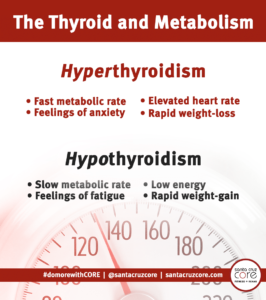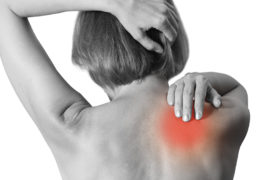Many individuals deal with thyroid issues in the United States. Thyroid is present in many forms and may cause unexplained weight-gain or weight-loss symptoms.
Thyroid disruptions greatly affect metabolism by slowing it down or speeding it up. Knowledge about the thyroid can help to treat problematic symptoms or may help to diagnose dysfunction.
The Thyroid
The thyroid is a butterfly-shaped gland that can be found in the anterior portion of the neck, below the cricoid cartilage. This gland is responsible for making thyroid hormone (TH) which is involved in regulating metabolic pathways throughout the body.
The thyroid is regulated by the activity of the hypothalamus and anterior pituitary gland. Thyrotropin-releasing hormone (TRH) is made by the hypothalamus and triggers the release of thyroid-stimulating hormone (TSH) from the anterior pituitary. TSH then stimulates the production of TH by the thyroid gland. The presence of TH then suppresses TRH and TSH release.
In this manner, the hypothalamus, anterior pituitary, and thyroid are involved in a self-regulating pathway. When dysfunction occurs, the feedback between the three glands is disrupted along with metabolism. This, in turn, leads to weight-gain or weight-loss.
Roles in the Body
The thyroid is involved in the regulation of metabolism at a cellular level, this includes the rates of protein synthesis and degradation as well as energy harvesting reactions. It is critical for child growth and development.
Hormones and Metabolism
The thyroid produces three important hormones- thyroxine (T4), triiodothyronine (T3), and calcitonin. T3 and T4 are collectively called “thyroid hormone” or just “TH.” These two are the most involved in metabolism and affect resting metabolic rate.
T3 and T4 affect cells of target tissues at a “transcriptional level.” What does this mean? It means that T3 and T4 affect a given cell’s nucleus directly and dictate what sections of DNA will be used to make proteins. Besides protein synthesis, cellular respiration is also affected by TH. Target tissues include the liver, skeletal muscle, and adipose tissue; all of which are involved in energy storage and use (1).
The third hormone made by the thyroid, calcitonin, is involved in the regulation of blood calcium and phosphorus levels. Calcitonin promotes calcium deposition from the blood into the bone.

Thyroid Disease
Diseases of the thyroid involve the overstimulation or under stimulation of the thyroid gland, leading to an abnormal level of TH. This has a direct effect on metabolic rate and may lead to excessive weight-gain or weight-loss.
Hyperthyroidism. This can be described as a hyperactive thyroid, meaning that TH (T3 and T4) is being produced excessively and is speeding up resting metabolism. This means that we are -on average- making and burning more energy, and building and degrading more body mass. A person with hyperthyroidism may feel symptoms of anxiety, elevated heart rate, and experience rapid weight-loss.
Hypothyroidism. This describes an underactive thyroid, meaning that not enough TH is being made to maintain a normal resting metabolic rate. This means that a person with hypothyroidism is making and burning energy, and building and degrading body mass at a rate slower than normal. A person with hypothyroidism may feel tired and sluggish, have low energy levels, and experience weight gain.
Remember, fluctuations in weight and energy are a natural part of life, and are most commonly due to lifestyle changes such as long periods of stress or a change in one’s exercise routine. However, if you have experienced a long period of unexplainable weight gain or loss, it may be time to consult your doctor or nutritionist.
References-
- Mullur, Rashmi, et al. “Thyroid Hormone Regulation of Metabolism.” Physiological Reviews, American Physiological Society, Apr. 2014, https://www.ncbi.nlm.nih.gov/pmc/articles/PMC4044302/.
- “Thyroid and Weight.” American Thyroid Association, https://www.thyroid.org/thyroid-and-weight/.
- “Thyroid Disease: Hypothyroidism & Hyperthyroidism.” Cleveland Clinic, https://my.clevelandclinic.org/health/diseases/8541-thyroid-disease.










Leave a Reply